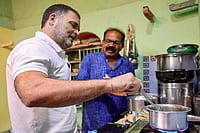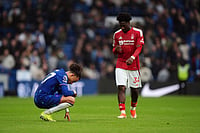For Imran Khan, cricket is now a thing of the past. Even though the 1992 World Cup sawhis team victorious, the Pathan has grown rather tired of the game. "It’s funny,you know, how little interest in cricket I now have," says Imran. "I scarcelyeven follow it these days." Now involved in running the cancer hospital he has helpedbuild at Lahore, he relates with passion how he "found God in cricket during the 1992World Cup". Since the tournament is remembered more for its complex and controversialrules relating to the readjustment of scoring targets in matches interrupted by rain thanfor good cricket, Imran believes it was God’s grace that saw Pakistan through.
A Divine Moment
Imran feels it was God's grace that broke Pakistan's gloomy Cup record in '92

"Three times in that Cup, rain was forecast. Had it rained once for even 10minutes one of those times, we would have been out of the tournament. Now I mean, that wasbeyond us. You know, forget about human endeavour." Other Cups give him no reason forcheer. "My memory still goes back to a very different scene, Lahore’s GaddafiStadium when we lost to Australia in the 1987 semi-final. We’d been expected to win.
Half the crowd was in tears and the rest in a state of shock. That day, Lahore’sstreets were deserted and for months afterwards wherever I went people only asked me aboutwhat went wrong. It was then that I realised what the World Cup meant to the people ofPakistan."
Imran is rather sceptical about the level of skills involved in the one-dayer,which he always held subordinate to the far more skilful five-day Test game. In fact, in1987, Imran arrived in Pakistan just six days before the Cup began. And, he didn’teven bother to think about any special tactics to employ during the preliminary rounds.But since the team was so used to playing in home conditions, they had no problem cruisingthrough to the semi-finals.
After the 1987 semi-final disaster against Australia where Javed Miandad came under alot of flak for slow batting, Imran didn’t envisage playing another Cup. He felt hisappetite for the game had gone, replaced by many concerns which ate into his cricket time.But despite his decision to stay away, in the end, he played on the insistence of hiscancer hospital’s board of governors.
It was then that he began to draw up a plan specifically to meet the requirements ofone-day cricket which he insists are very different from the Test game. Says Imran:"It starts with the attitudeof the bowlers and batsmen. It’s not talent butcombinations that count. In my mind, in our one-day combinations, Waqar Younis was a keyplayer. I’ve always believed that to be successful here one must attack. Nothingstrips the opposition’s run rate more than the fall of a wicket, as Englanddiscovered in the 1992 final."
Another key bowler was Abdul Qadir, the master leg-spinner. But a tornAchilles’ tendon forced him out of the 1992 Cup. Even Waqar developed a stressfracture in his back. However, according to Imran, the most frustrating injury was to hisown bowling shoulder which restricted his batting, bowling and fielding. He adds:"But in spite of all these setbacks this strong feeling remained in me that the Cupwas destined for Pakistan. Whether it was because of my great faith in God or because Iwas so desperate for the sake of my hospital, I am not sure. Probably both."
Talking about the final with England, Imran says the toss was crucial because of theearly moisture which meant the ball would not come on to the bat. Pakistan lost the tossand were sent in to bat by Graham Gooch. The loss of the two in-form openers did not help.Then, Imran promoted himself to number three. That put Miandad and him right in the centreof things and they were very clear about what they had to do—stay there until thelast 20 overs till the ball lost its shine. "Fortunately things did go accord-ing toplan," says he. "We accelerated at the right time and then got out at the righttime to let Inzamam-ul-Haq and Wasim Akram have a go at the English bowlers. In fact, whenJaved (Miandad) got out he was suffering from stomach cramps."
But for Imran, the greatest source of pleasure in 1992 was Inzamam’s success. Sayshe: "When I wanted him in the team, his nominations was opposed by one or twoselectors but fortunately my cousin, Javed Burki, who was chairman of the selectioncommittee, backed me." That decided Pakistan’s chances for the better and sealedImran’s reputation as the ultimate talent spotter.?

























